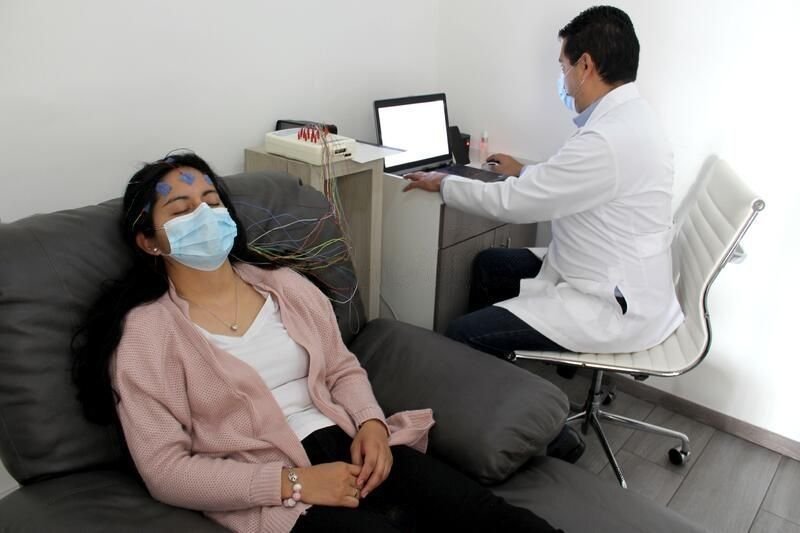What is a Brain Map?
Brain mapping test is the functional mapping of brain areas using various techniques. It’s an ever-evolving field with multiple tests like fMRI, qEEG, sLORETA, SPECT, regional cerebral blood flow monitoring, and IR spectroscopy. Some of these tests are invasive. Some are non-invasive. Our clinic offers non-invasive brain mapping using quantitative EEG(qEEG) and standardised low-resolution electromagnetic tomographic analysis(sLORETA).
How is Brain Mapping Done?
Brain mapping is a non-invasive (painless) investigation in which electrodes are attached to the scalp using a simple wearable cap. Various electrical waves generated in the brain are recorded through this device.
The reading, though similar to electroencephalography (EEG), is quantitatively measured from different networks and areas in the brain. These are interpreted by trained professionals using standardised norms and correlating with patients’ symptoms.
This procedure assists doctors in determining whether parts of your brain are under or over-active. The information gathered will create a personalised brain training plan to help you manage your symptoms and accomplish your mental health goals.
The certified neurofeedback professional will take the patient through numerous tasks and exercises designed to improve brain function throughout a brain training session. These activities include playing games, watching videos, or listening to music. As the patient completes these exercises, the technician will monitor their brain activity and provide real-time feedback to help them learn how to regulate their brainwave patterns better.
This therapy teaches the brain to perform more efficiently over time, improving a range of areas, including attention, memory, mood, and sleep. Brain mapping therapy has also been demonstrated to help treat various diseases, such as ADHD, anxiety, depression, and post-traumatic stress disorder (PTSD).
What Are The Benefits Of the Brain Mapping Test?
There are multiple approaches to address cognitive function issues, but many standard treatments need to provide the wide range of advantages that brain mapping and neurofeedback do.
One of the most significant benefits of these therapies is their capacity to provide a more accurate diagnosis and treatment plan for people suffering from neurological illnesses or mental health concerns.
Providers can design more tailored and effective treatment choices by pinpointing specific parts of the brain that may be contributing to symptoms. Brain mapping is also a non-invasive and painless service. Unlike other diagnostic tests, which may include complex procedures or uncomfortable testing, brain mapping is as simple as inserting electrodes on the scalp to measure and record brain activity.
This therapy can also be used to track treatment efficacy over time. By monitoring changes in brain activity, physicians can establish whether a specific treatment method or strategy is effective and make the necessary modifications.
Overall, there are various advantages to using this therapy. It can improve people’s lives suffering from neurological illnesses or mental health difficulties. Brain mapping can help people achieve better outcomes and improve their quality of life by offering more accurate diagnoses and treatment alternatives.
What are the Types of Brain Maps Offered at Serenity?
Quantitative EEG (qEEG): Electrical waves from multiple areas in the brain are cross-sectionally measured and summated to give a comprehensive idea of various areas affected by mental illness. This helps us understand the diagnosis as well as further management. It also provides valuable information about various networks which control attention, emotions, memory, and sensory-motor abilities.
Standardised low-resolution electromagnetic tomographic analysis (sLORETA): Using sLORETA, the density of electrical signals in various brain parts is measured and compared with the standardised norms. This helps us understand the deviations in brain functioning in specific mental health issues and helps diagnose and personalise treatment.
What Happens After Brain Mapping Test?
A comprehensive addiction treatment plan is developed using information from your brain mapping session (together with clinical and medical evaluations) by highly qualified professionals. Your initial brain mapping report also serves as a baseline against which you can track your improvement over time.
Neurofeedback could be a part of your plan. Neurofeedback, a biofeedback, employs a reward system, such as music or gameplay, to usually teach your brain to work. Neurofeedback can be an essential part of your overall addiction treatment schedule. It can also help address underlying mental health issues, including anxiety and depression, ADHD and PTSD
Is Brain Mapping Test Necessary?
Brain mapping is essential for treating ADHD, Autism, PTSD, and others. Custom-tailored protocols guided by qEEG brain mapping give patients the best chance of obtaining long-term symptom reduction.
We use qEEG brain mapping to determine which brainwave patterns and functional networks work improperly and the brain regions where the dysregulation occurs. This allows us to develop much more targeted and exact treatment methods.
This information enables our clinicians to develop a personalised treatment approach for each patient, and we utilise it to drive our neurofeedback and neuromodulation therapies. Determining whether a patient’s symptoms are neurophysical without a qEEG brain map is difficult.
Indeed, utilising a qEEG brain map is similar to using an X-ray to assess whether or not a patient with wrist pain has carpal bone fractures. Without the X-ray, it might be challenging to determine the best course of treatment, and the doctor must make an informed guess as to how to address the patient’s symptoms.
When combined with clinical results, qEEG brain mapping is an essential diagnostic tool. It should be utilised whenever possible because brain mapping helps clinicians identify where dysregulation occurs in the brain, allowing them to address the source of the patient’s symptoms with tremendous success. You can contact us to learn more about our brain mapping test cost in Delhi.
How is Brain Mapping Helpful in Diagnosis and Treatment?
Brain mapping is helpful in multiple disorders.
Neuropsychiatric Disorders like:
- Epilepsy
- Traumatic brain injury
- Memory problems
- Dementia
- Stroke


